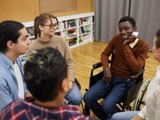One Year of the RITES Committee
On Tuesday 27th June 2023, we celebrated the one-year anniversary of our RITES Committee – a coalition of lived experience experts who use and advocate for the Human Rights Act in everyday life. The event was hosted by our trustee, Baroness Tanni Grey-Thompson, in the House of Lords and Parliamentarians and civil society groups were invited to hear the experts talk about why the Human Rights Act matters to them.
The Committee first came together in opposition to the Rights Removal Bill – a proposed law that would have removed the Human Rights Act and made it harder for everyone in the UK to access their rights. However, hours before the event was due to begin, Justice Secretary Alex Chalk announced that the UK Government will no longer be proceeding with the Rights Removal Bill.
Baroness Grey-Thompson
Baroness Grey-Thompson opened the event by acknowledging the Justice Secretary’s announcement. She talked about the work that has been done by people and organisations across the UK to celebrate the Human Rights Act and highlight the dangers of the UK Government’s attempts to get rid of it. She also stressed the importance of greater understanding of and education in human rights.
The RITES Committee
Lucy then introduced the RITES Committee. As she explained, “we are all passionate about the work that we do and are in the unique position to be able to share real-life insights, tips, experiences and stories.” Lucy explained some of the work the Committee has done so far, including submitting evidence to the Joint Committee on Human Rights, and shared the Committee’s mission to “keep power in the hands – and the voices – of the people.”
Charli Clement
Charli talked about her experiences as an inpatient on a Children & Young People’s Mental Health Services ward and then as a Lived Experience Expert who co-designs and co-delivers BIHR’s training for NHS staff. She talked about specific rights that are often put at risk when people access inpatient services, including the right to possessions (Article 1, Protocol 1) and the right to private and family life (Article 8). Charli talked about the impact of hospitals taking away important sensory items and imposing blanket bans on mobile phones, which essentially cut her off from her friends and family.
Lucy Hinksman and Sian Huntley
Lucy and Sian then shared their experiences as members of Pembrokeshire People First – an independent charity run by and for adults with learning disabilities and/or autism. They shared the ways that their members have been able to challenge large statutory organisations, including when their local health board started a consultation without providing accessible information. The consultation did not recognise that people with complex needs were being placed in mental health inpatient facilities rather than being given appropriate support in the community. Pembrokeshire People First members challenged both the lack of accessible information and the proposals put forward and the health board eventually provided Easy Read information and more time to respond.
Danielle Roberts
Danielle is a Senior Policy Advisor at Here NI – a community organisation and charity supporting lesbian and bisexual women in Northern Ireland. She talked about the importance of the Human Rights Act and judicial review as a way of securing the rights of LGBTQIA+ people. She emphasised that “rights aren’t pie – more rights for me doesn’t mean less rights for you”. Danielle also talked about how important it is to celebrate human rights protections – especially in light of the morning’s announcement that the Rights Removal Bill has been stopped.
Fairuz Choudhury
Fairuz is a Programmes Manager at Hopscotch Women’s Centre, which offers a series of services for women under the influences of inequalities and abuse as well as home care. Fairuz emphasised that women’s rights are human rights and talked about experiences of unfair treatment from local authorities and agencies such as housing services, police and social services. She discussed the way the Hopscotch team are empowering members of their Survivors Peer Support Network for women who have experienced domestic abuse to use the Human Rights Act to access the support and services they’re entitled to.
Catriona Moore
Catriona talked about her experiences as the parent of a disabled teenager with complex needs and Policy Manager at IPSEA (Independent Provider of Special Education Advice). She explained that one of the biggest weaknesses in the way the Special Educational Needs and Disabilities (SEND) system works is the lack of accountability mechanisms that ensure public bodies follow the law. The Human Rights Act provides a vital way for families to make sure children receive the appropriate support and bringing cases to court can result in wider improvements in policy to the benefit of others.
Ian Penfold
Ian is a parent and carer who has dedicated his time to promoting the needs of people living with a learning disability and/or autism through his work with a variety of groups, charities and services. While much of his talk focused on people with a learning disability and/or autism, Ian also talked about the profound impact that poor services can have on families: “Some may blame themselves, thinking that they have failed their loved one or wonder if they could have done more to help them, and may feel profound sadness, anxiety, depression, or grief as a result.”
Eleanor Hourigan
Eleanor is the Secretary for the Parliamentary Assembly of the Council of Europe’s Committee on Legal Affairs and Human Rights. She discussed the Council of Europe’s recent report, which raised concerns that “recent legislation introduced by the UK Government to Parliament, and in particular the Bill of Rights Bill and the Illegal Migration Bill, indicates an increased willingness on the part of the UK Government, and certain legislators, to legislate in a way that could risk breaching the UK’s international legal obligations and thus the rule of law.” She explained that the rule of law includes international law (like the European Convention on Human Rights) – something that is not always talked about in the UK.
Sir Nicolas Bratza
Sir Nicolas Bratza, chair of BIHR’s board of trustees and former president of the European Court of Human Rights, closed the event by talking about the changing landscape of human rights over time. He described his time as a judge on the European Court of Human Rights where he saw firsthand the positive impact of the Human Rights Act in enabling people to bring their cases in the UK. He also talked about the UK Government’s recent onslaught of attacks on the Human Rights Act, quoting Sir Robert Buckland in describing the proposals to change the Act as “a cure in search of a problem.”
Questions & Answers
Attendees then had the chance to ask the speakers questions.
What do you get out of working together as a Committee?
Members of the Committee talked about the benefits of working as part of such a diverse team with different areas of expertise. Danielle talked about the strength of having members from different areas of the UK while Charli talked about learning from other members as a young activist. Fairuz highlighted how important it is to work with people in other sectors to see the wide-ranging reach of human rights.
Are you going to work on the consultation for a Human Rights Bill for Scotland?
Sanchita explained the work BIHR has done so far on supporting human rights developments in Scotland and emphasised the importance of building on human rights protections with the Human Rights Act as a foundation.
What are you going to do now the Rights Removal Bill has been stopped?
Sanchita talked about the ongoing work of BIHR to protect and celebrate human rights. Eleanor also talked about the risks posed by other pieces of legislation such as the Refugee Ban Bill and the Victims & Prisoners Bill. She explained how these Bills would remove human rights protections from specific groups of people, making it “more palatable” for the UK Government to remove human rights protections from everyone in the future. While she welcomed the news that the UK Government will not proceed with the Rights Removal Bill, she urged civil society to keep up the momentum celebrating the Human Rights Act in real life.
Read about the universality of human rights
Have you been pleasantly surprised or bitterly disappointed by the human rights knowledge of staff working in public services?
Charli talked about her experience both as an inpatient and while delivering training to NHS staff where she was disappointed at the lack of understanding of human rights. However, she also described seeing staff have “lightbulb moments” during the workshops – particularly when they realise the impact that having her rights breached has had on her even years later.
These lightbulb moments get to the heart of what BIHR does and why it’s so important that the voices of people with lived experience are heard by the people with duties to uphold human rights. As we enter the second year of working with the RITES Committee, we will continue to amplify these voices through all our work with people, public bodies and policymakers.
Related topics
Stay up-to-date
Get our newsletter
Get monthly updates on UK human rights law and our work, resources and events sent straight to your inbox.



